A
Promise
Kept
First 9/11 Scholarship recipient discovers the power of community
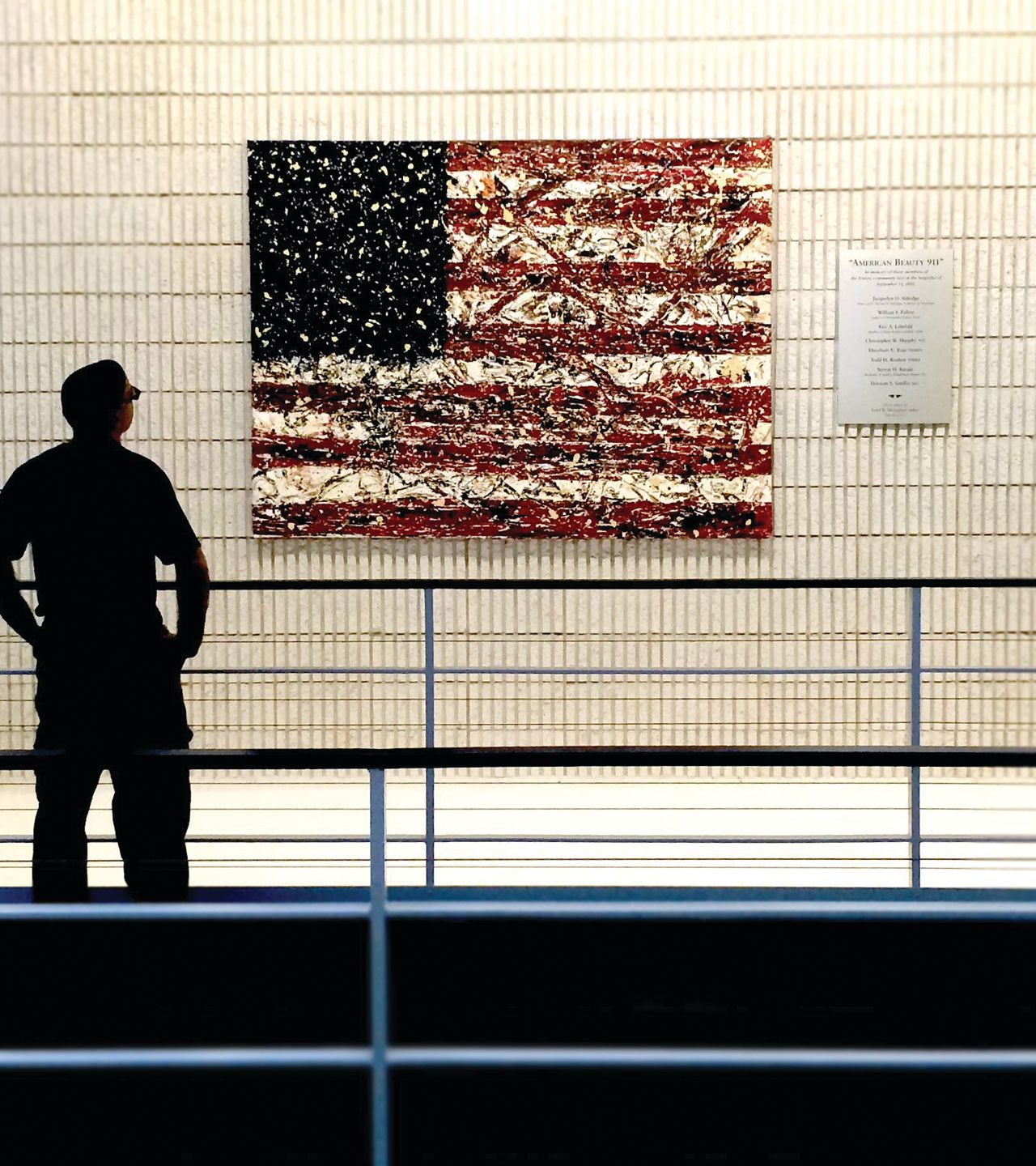
This story begins with a promise.
A few months after hijacked passenger planes carried out coordinated terrorist attacks on the twin towers of the World Trade Center in New York City and the Pentagon in Washington, D.C., then–Emory President William M. Chace called a family meeting.
Throughout the nation, the pain of those events was still raw and palpable, and even today, President Chace remembers the urgency that compelled him to bring together Emory alumni from throughout that grief-stricken city.
And so they came, gathering at the University Club in midtown Manhattan to remember the thousands killed in those attacks, including three Emory alumni, the husband of an Emory alumna, the parent of a student then attending Emory, and the sister of a faculty member.
It was a large crowd, and looking around the room, Chace recalls a gathering infused with heartfelt emotion. “We were all hurting, and in those days many people felt the sense of being part of a larger family—a time of gathering closer, a feeling that we were all in this together.”
That same month, Andrea Shindelman Russin 89C received a letter. It arrived amid a torrent of support and sympathy that had flooded her mailbox after the World Trade Center attacks. So much mail, in fact, that a small army of kind-hearted volunteers had stepped forward to help her open it all in those hazy days following 9/11.
But this one stood out. The letterhead announced that it was from the Office of the President of Emory University. “Dear Mrs. Russin...” it began.
“We were all hurting, and in those days many people felt the sense of being a larger family—a time of gathering closer, a feeling that we were all in this together.”
“On behalf of Emory University, I write to you to express our deepest sympathies on the terrible loss you suffered on September 11. Everyone in the large family that makes up the life of this University is aware that, within our number, great pain has come and a part of ourselves has been taken away...”
For Russin, the loss was indeed unfathomable. Her husband, thirty-two-year-old Steven H. Russin, was working on the 104th floor of the North Tower at the World Trade Center, where he served as a securities trader for the brokerage firm Cantor Fitzgerald, when the first plane struck.
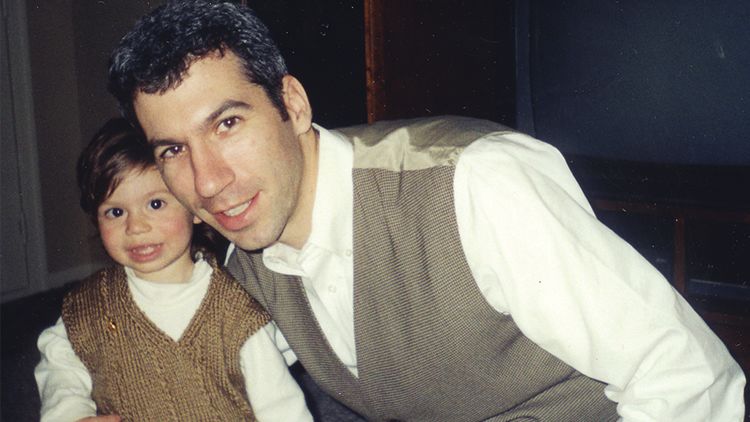
Moments in Time: Steven and Alec Russin.
Their son, Alec, was two years old. Fraternal twins, Olivia Sabrina Gail and Ariella Sarah Dayle, were born by Caesarean section four days after their father’s death. Leaving the hospital afterward, every flag they passed flew at half-staff.
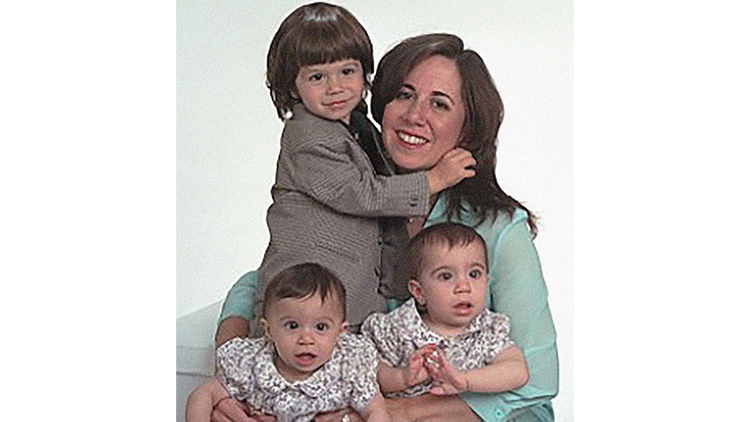
The Way Forward: Andrea Russin with her three children.
The days that followed were a blur. At times, Russin felt as if the entire world was reaching out with support, including beloved college friends from across the country who called or flew in to help care for her children. She recalls a team of uniformed firefighters from New York City arriving by fire engine to babysit. One day, a professional model showed up, announced she was there to clean Russin’s shelves, piled her hair atop her head, and started pulling out dishes.
She joined five different grief groups, including one made up of sixty World Trade Center widows. In her town alone, she knew of four women who lost husbands in the attack.

Moments in Time: Steven and Alec Russin.
Moments in Time: Steven and Alec Russin.

The Way Forward: Andrea Russin with her three children.
The Way Forward: Andrea Russin with her three children.
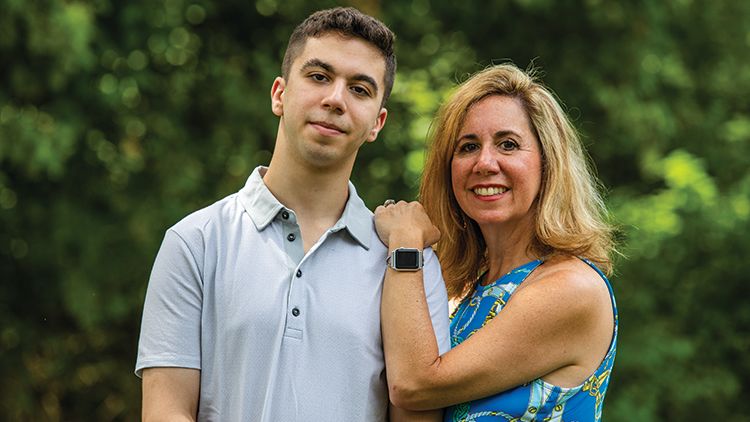
Family Legacy: Alec Russin and his mom, Andrea Russin, at their home in Princeton, New Jersey, where they have the only Emory flag on the street.
And there, in the midst of it all, was a letter from Emory, offering “to acknowledge her loss in a way that keeps memory alive and the Emory family as strong as it can be,” Chace wrote.
“Once you are a student, you are always part of the Emory family."
“Back then, there was a village that emerged, and Emory became part of that village, standing by us,” Russin recalls. “Emory has always shown its commitment to its community. Once you are a student, you are always a part of the Emory family.”
On instinct, she made three copies of the letter. Securing a fireproof safety deposit box, she placed one copy safely inside.

Family Legacy: Alec Russin and his mom, Andrea Russin, at their home in Princeton, New Jersey, where they have the only Emory flag on the street.
Family Legacy: Alec Russin and his mom, Andrea Russin, at their home in Princeton, New Jersey, where they have the only Emory flag on the street.
A Big Impression
It was more than thirty years ago that Russin found her own path to Emory.
At the time, Emory’s reach was expanding far beyond the regional South, and it had been suggested that Russin consider checking out the Atlanta campus. So it was that Emory became one more stop on a family trip to visit colleges up and down the East Coast, starting in Washington, D.C., and sweeping southward into Florida.
Arriving at Emory, she vividly recalls being greeted by Rita Duffy, a receptionist in the admission office widely known for the warmth and ease she brought to her job. “She was an icon in her day,” Russin laughs. “Everybody knew her, and if you met her, you never forgot her.”
Instead of engaging with her parents, Duffy began chatting with Russin, asking how her trip was going, what schools she’d visited and her thoughts about them. It was an instant point of connection, and one that Russin remembers to this day.
“She was talking to me, not my parents,” she says. “As a seventeen-year-old, that made a very big impression. There was a warmth and intimacy on the most basic level, and moving across the rest of the university, I found a similar feeling.”
The visit clinched her decision. She arrived at Emory eager to attend a school where former President Jimmy Carter was a professor, intent on studying journalism in a town that was developing a robust new twenty-four-hour-cycle news concept. In fact, Russin would eventually secure an internship at CNN, working on a political beat.
In time, a broad exposure to the liberal arts would expand her focus. She graduated as a philosophy and sociology major. “Emory changed me,” she says. “It allowed you to think in an entirely different way, learning with people who had so many different experiences and ideas.”
She would go on to earn master’s degrees from New York University in psychology and occupational therapy.
In 1994, Russin met her future husband at a bar in the World Financial Center, a few blocks from the twin towers. That night, he walked her to a bus stop to make sure she arrived safely. They married two years later; in 1998 they moved to Randolph, New Jersey, starting a family with the birth of Alec.
Today, living in Princeton, New Jersey, the Russins remain a proud Emory family. In a town where many houses fly a banner bearing the year they graduated from Princeton, her own yard flag and license plate cover promote Emory. “We stand out,” she laughs.
For Alec, growing up in a university town carried expectations that he would choose Princeton. There would be opportunities to be considered at other universities, too. Once Alec reached high school, Russin hoped that he would consider Emory.
But that choice, she decided, would be Alec’s alone.
The Seed of an Idea
In February 2002, nearly six months after September 11, Emory hosted another alumni gathering.
This time, some 275 people assembled at the Clifton Wharton Auditorium in midtown Manhattan to honor both the victims and heroes of the 9/11 terrorist attacks. The mood of the evening was somber, but hopeful.
William L. Cohen 64C, a lifelong New Yorker, was present that night, as he had been at Emory’s gathering only a few months earlier—an event that, for Cohen, planted the seed of an idea.
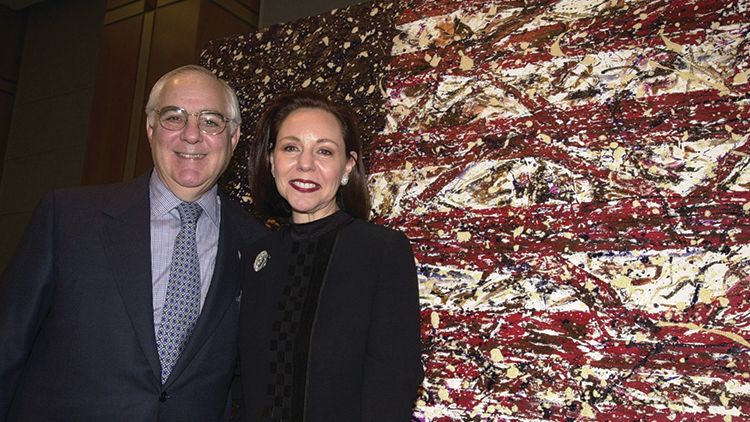
Dedication: Bill and Michele Cohen at the dedication of the work American Beauty 911, created by alumnus Todd Monaghan in honor of Emory 9/11 victims.
On the morning of the attack, Cohen, a real estate developer and CEO of Andover Properties, was on his way to work the morning of the attacks when his wife, Michele, called out, “Don’t you know what’s happening? Turn on the television!”
Their sons, Brian and Jonathan Cohen 95C, were working downtown that morning; they were relieved to learn they were both safe. But for weeks, there would be a rolling procession of funerals at synagogues and churches throughout the city.
Following the attacks, the Cohens had quickly reported to a hospital to donate blood, only to be turned away. “They couldn’t handle the outpouring of volunteers,” Bill recalls.
Prior to the 9/11 attacks, the Cohens were already talking to Emory about funding a student scholarship; something merit-based that could truly impact young lives.
Cohen’s own commitment to Emory was well established. He had arrived at Emory in 1960 intent on earning a bachelor’s degree in history before perhaps going on to law school.
“From the day I first visited as a senior in high school to graduation, what stood out to me was the camaraderie, gentility and friendliness that I found here,” he says. “I basically fell in love with the school and made life-long friendships.”
In addition to working with a range of corporate and philanthropic boards, Cohen would go on to serve on the Emory ECCA Board and the Emory Board of Visitors.
Learning that Emory had offered to help the children of the victims of the World Trade Center attacks, Cohen was pleased, but not surprised. “It was simply the right thing to do,” he says.
At the February 2002 alumni gathering, there was an announcement: For the next twenty-five years, the Cohens would dedicate the corpus of the scholarship they’d been building to support any student admitted to Emory who was the child of an alumni victim or spouse.
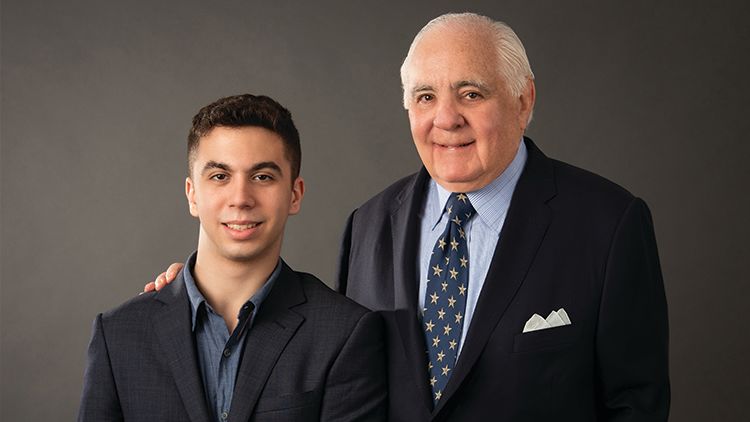
Promise Fulfilled: 9/11 Scholarship recipient Alec Russin 22C recently met with with donor William L. Cohen 64C.
It would be called the Cohen 9/11 Scholarship, providing the financial means to follow through on President Chace’s promise.

Dedication: Bill and Michele Cohen at the dedication of the work American Beauty 911, created by alumnus Todd Monaghan in honor of Emory 9/11 victims.
Dedication: Bill and Michele Cohen at the dedication of the work American Beauty 911, created by alumnus Todd Monaghan in honor of Emory 9/11 victims.
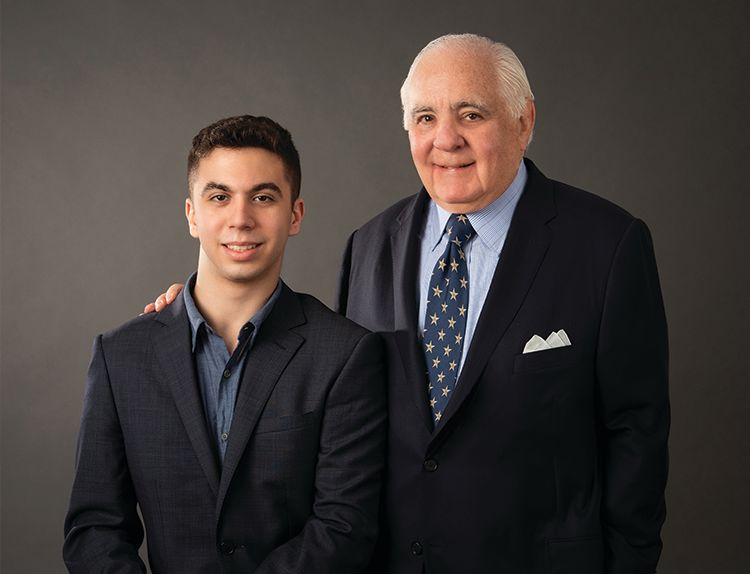
Promise Fulfilled: 9/11 Scholarship recipient Alec Russin 22C recently met with with donor William L. Cohen 64C.
Promise Fulfilled: 9/11 Scholarship recipient Alec Russin 22C recently met with with donor William L. Cohen 64C.
A New Generation
When it came to choosing a college, Alec Russin had a few requirements.
“From the beginning, I was very much against choosing a school that required me to declare my major coming in,” he explains. “And I wanted a campus that offered a good culture, a place where I could see myself fitting in.”
His first visit to campus happened to coincide with the Emory School of Medicine’s Match Day. Initially, Alec felt utterly out of place. Navigating a campus awash in white doctor’s coats, he knew that wasn’t his path.
Later, while touring another nearby campus, he pulled his mother aside. “Let’s go back to Emory,” he told her. At second glance, he liked what he saw: A diverse student body; people who weren’t afraid to be individuals; a culture that embraced art and academics and creativity.
While visiting Oxford College, Alec noticed a student wearing a t-shirt promoting a band that he admired. Noting his interest, the Oxford student approached, high-fived him and exchanged contact information. They would text for weeks—an organic point of connection.
Andrea was thrilled. Not only that her son had found what she’d also loved about Emory, but a campus community that genuinely felt like a good fit.
As a child of 9/11, Alec knows both private pain and public scrutiny. His father exists for him primarily in photographs and treasured stories: This good-natured man who loved chocolate, telling jokes, and sports of every stripe. A guy with an irrepressible sense of fun, who thought nothing of trading Pokémon cards with neighborhood kids or dressing up as Spiderman for Halloween.
While touring Emory, the Russins made a point of visiting the atrium of the Woodruff Physical Education Center to see “American Beauty 911”—a painting by artist and filmmaker Todd Monaghan 86B. Beside it, a plaque honors “those members of the Emory community lost in the tragedies of 911,” and it includes his father’s name.
Andrea wanted her son to see it, to know it—a reminder that there are people who care about him. “Emory has always shown its commitment to the community,” she says. “Once you are a student at Emory, you are part of their family.”
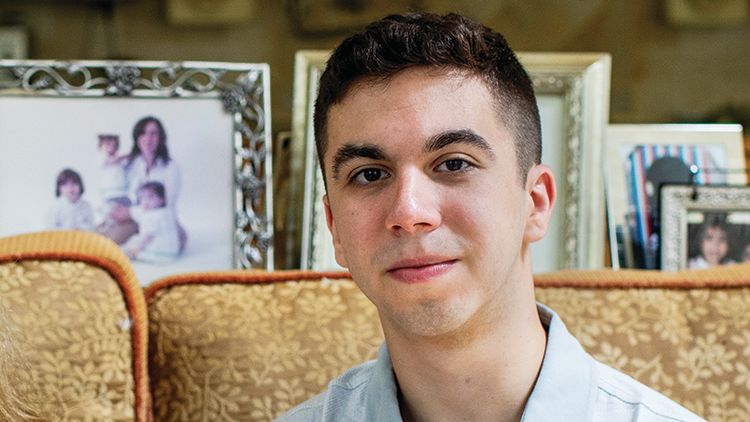
Looking Forward: The first recipient of the Cohen 9/11 Scholarship, Alec Russin recently started his sophomore year at Emory.
Last fall, Alec Russin became the first recipient of the Cohen 9/11 Scholarship.
During his first year, Alec found his own path, choosing a major—a dual degree program that encompasses studying economics at Emory and industrial and systems engineering at Georgia Institute of Technology—discovered a love of statistics (a favorite class, so far), and pledged a fraternity.
With a background playing in rock bands throughout high school—most recently, the pop punk/post-hardcore Cold Soil—he also helped found the Emory Musicians Network, a club for students seeking a creative musical outlet.
During the summer, Alec had a chance to meet the Cohens over lunch—to get to know one another, reminisce about Emory, and talk about his academic path when he returned to campus to begin his sophomore year this fall.
For the Cohens, knowing the scholarship is being used brings a mixture of emotions. “Obviously, my wife and I have empathy for any young person who was affected by this tragedy,” he explains. “We’re happy to participate and help others.”
Meeting Alec "has only strengthened the realization that our decsion was the right one," Cohen adds. "He will use his education well."
In a sense, he says, seeing the fulfillment of Emory’s promise to families touched by a painful chapter of our shared history underscores the resilience of both young people and the entire nation.
"As Benjamin Franklin said, 'An investment in knowledge pays the best interest,'" he says. "That's why we believe in paying it forward."
Story by Kimber Williams. Opening image: American Beauty 911 by New York artist Todd Monaghan 86B, created in honor of Emory alumni lost; purchased by Emory University. Photo by J Patrick Herold. Interior photography by Demetrius Freeman unless otherwise noted.

Looking Forward: The first recipient of the Cohen 9/11 Scholarship, Alec Russin recently started his sophomore year at Emory.
Looking Forward: The first recipient of the Cohen 9/11 Scholarship, Alec Russin recently started his sophomore year at Emory.
Want to know more? Please visit
Emory Magazine
Emory News Center
Emory University


